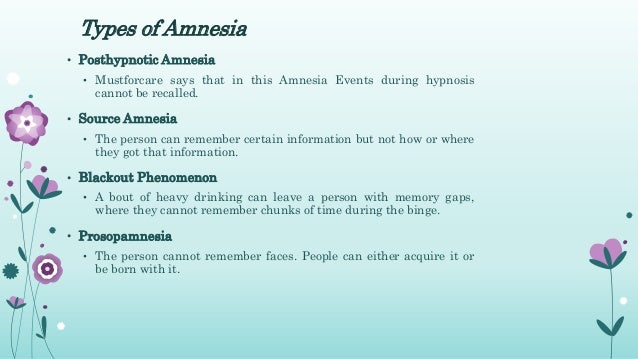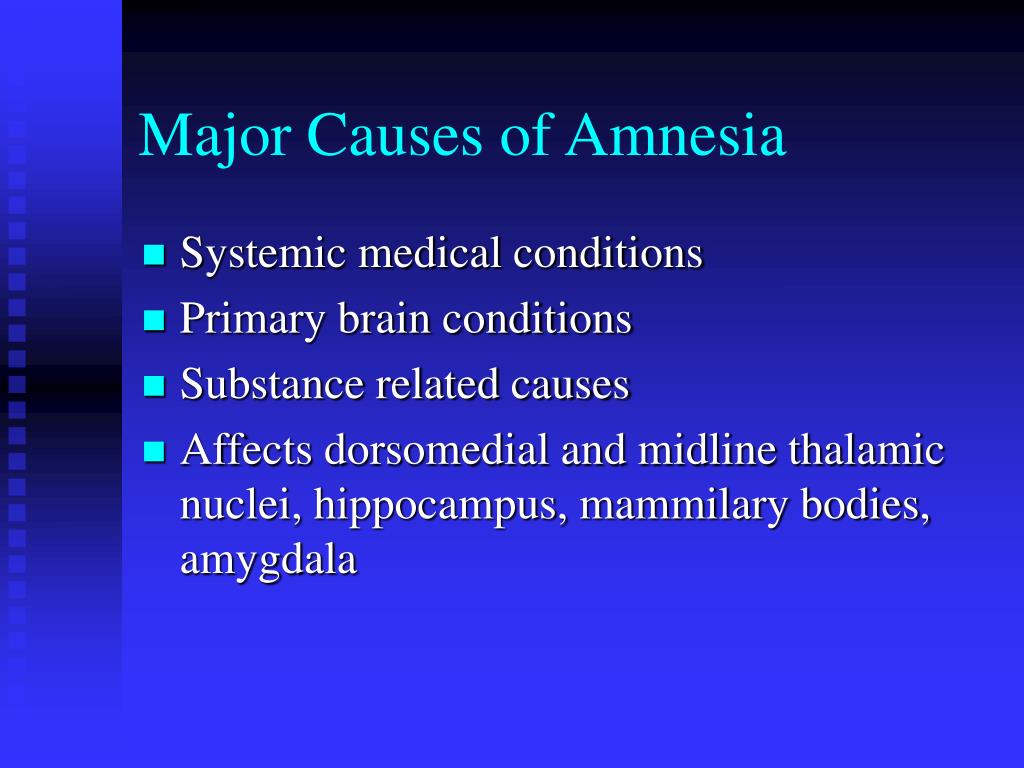

- #Drugs that cause temporary amnesia full
- #Drugs that cause temporary amnesia plus
#Drugs that cause temporary amnesia plus
For example, if your personal identification number (PIN) is 2040, remember it with the phrase "20 plus 20 equals 40." To recall numbers, group them and then relate them to a date or story.To remember a person's name, repeat it several times after you are introduced.Hang your keys from it every time you come in.

Store easy-to-lose items in the same place each time after you use them.Keep it in a place where you can see it easily. Write your daily activities on a calendar, a planner, or in your phone.Use lists, notes, and other helpful devices as reminders.Structure your environment to help improve your memory.
#Drugs that cause temporary amnesia full
Slow down, and pay full attention to the task you are doing now.Ĭomplete common tasks in the same order each time you do them. Often, forgetfulness may mean that you have too much on your mind. Try these steps to help improve your memory. In most cases, having a memory lapse now and then doesn't mean that you have a serious problem. Self-Care Caring for yourself when you have memory lossĪs you age, it's normal to have some memory lapses. Coma is a deep, prolonged state of unconsciousness. Fainting ( syncope) is a form of brief unconsciousness. A person who loses consciousness isn't awake or aware of his or her surroundings. This can help your doctor find the cause of your symptoms.Ī decrease in alertness may progress to loss of consciousness. It's important to look for and tell your doctor about other symptoms you have when confusion or decreased alertness occurs. Many times there are other symptoms, such as a fever, chest pain, or not being able to walk or stand. Exposure to toxins (poisons), such as carbon monoxide.
 Decreased oxygen in the blood (hypoxia) from high altitude. This often affects older adults when their environment and routines are changed. Sexually transmitted infections, such as syphilis (late-stage) and human immunodeficiency virus ( HIV).Ĭonditions in the environment that can cause changes in the level of consciousness include:. Infection, such as a brain abscess, encephalitis, meningitis, or sepsis. This may occur during a transient ischemic attack (TIA) or a stroke. Decreased or blocked blood flow to the brain. Other causes of confusion or decreased alertness can include: Drug intoxication or the effects of withdrawal. Misusing a medicine or alcohol use disorder. This is a problem that often affects older adults, who may take many medicines at the same time. Overuse of medicines may be the single biggest cause of memory loss or confusion in older adults. Taking too much of a medicine (overmedicating) or taking medicines that may interact with each other. These include hypothyroidism, myxedema coma, and hyperthyroidism.Īlcohol and many prescription and non-prescription medicines can cause confusion or decreased alertness. Mental health problems, such as depression or schizophrenia. One example is alcohol use disorder ( Wernicke-Korsakoff syndrome). Malnutrition and vitamin deficiencies caused by health problems. They cause high levels of toxins to build up in the blood. Examples are heart failure, coronary artery disease, and irregular heartbeats (arrhythmias). Cardiac problems that reduce blood flow. They cause a decrease in the amount of oxygen or an increase in the amount of carbon dioxide in the blood. Examples are urinary tract infections, respiratory infections, and sepsis. Health problems that can cause it include: It depends on what caused it.Ĭonfusion or decreased alertness may be the first symptom of a serious illness. Amnesia may be either short-term or permanent. It can also be caused by a severe emotional event, such as from combat or a car crash. Amnesia is memory loss that may be caused by a head injury, a stroke, or substance use. It can also be caused by an infection or other health problem that starts or gets worse. One cause is withdrawal from alcohol or drugs or medicines. It can cause confusion, changes in the sleep-wake cycles, and unusual behaviour. Delirium is a sudden change in how well a person's brain is working (mental status). Alzheimer's disease is the most common cause of dementia in people older than 65. Many health conditions can cause dementia or symptoms like it. It may occur over several weeks to several months. Dementia is a slow decline in memory, problem-solving ability, learning ability, and judgment. Memory loss that starts suddenly or that clearly interferes with how well you can function in daily life may be a sign of a more serious problem. This type of memory problem is more often annoying than serious. But these changes can be a normal part of aging. Not all older adults have memory changes. As you age, it may take you longer to remember things. Or maybe you forget where you parked your car or the name of an acquaintance. It's not unusual to sometimes forget where you put your keys or glasses.
Decreased oxygen in the blood (hypoxia) from high altitude. This often affects older adults when their environment and routines are changed. Sexually transmitted infections, such as syphilis (late-stage) and human immunodeficiency virus ( HIV).Ĭonditions in the environment that can cause changes in the level of consciousness include:. Infection, such as a brain abscess, encephalitis, meningitis, or sepsis. This may occur during a transient ischemic attack (TIA) or a stroke. Decreased or blocked blood flow to the brain. Other causes of confusion or decreased alertness can include: Drug intoxication or the effects of withdrawal. Misusing a medicine or alcohol use disorder. This is a problem that often affects older adults, who may take many medicines at the same time. Overuse of medicines may be the single biggest cause of memory loss or confusion in older adults. Taking too much of a medicine (overmedicating) or taking medicines that may interact with each other. These include hypothyroidism, myxedema coma, and hyperthyroidism.Īlcohol and many prescription and non-prescription medicines can cause confusion or decreased alertness. Mental health problems, such as depression or schizophrenia. One example is alcohol use disorder ( Wernicke-Korsakoff syndrome). Malnutrition and vitamin deficiencies caused by health problems. They cause high levels of toxins to build up in the blood. Examples are heart failure, coronary artery disease, and irregular heartbeats (arrhythmias). Cardiac problems that reduce blood flow. They cause a decrease in the amount of oxygen or an increase in the amount of carbon dioxide in the blood. Examples are urinary tract infections, respiratory infections, and sepsis. Health problems that can cause it include: It depends on what caused it.Ĭonfusion or decreased alertness may be the first symptom of a serious illness. Amnesia may be either short-term or permanent. It can also be caused by a severe emotional event, such as from combat or a car crash. Amnesia is memory loss that may be caused by a head injury, a stroke, or substance use. It can also be caused by an infection or other health problem that starts or gets worse. One cause is withdrawal from alcohol or drugs or medicines. It can cause confusion, changes in the sleep-wake cycles, and unusual behaviour. Delirium is a sudden change in how well a person's brain is working (mental status). Alzheimer's disease is the most common cause of dementia in people older than 65. Many health conditions can cause dementia or symptoms like it. It may occur over several weeks to several months. Dementia is a slow decline in memory, problem-solving ability, learning ability, and judgment. Memory loss that starts suddenly or that clearly interferes with how well you can function in daily life may be a sign of a more serious problem. This type of memory problem is more often annoying than serious. But these changes can be a normal part of aging. Not all older adults have memory changes. As you age, it may take you longer to remember things. Or maybe you forget where you parked your car or the name of an acquaintance. It's not unusual to sometimes forget where you put your keys or glasses.







 0 kommentar(er)
0 kommentar(er)
